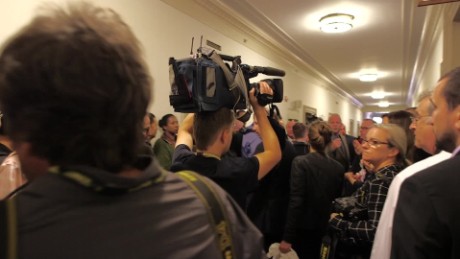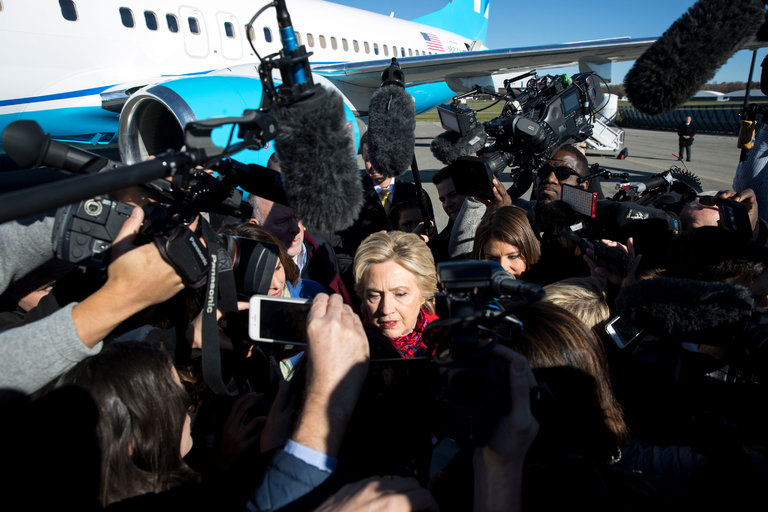
Overhyped coverage of hacked emails was US media’s worst mistake in 2016 — one sure to be repeated if not properly understood. TV was biggest offender, but print media was hardly blameless. The sensationalism exacerbated a second problem with the coverage: the obsession with Clinton’s private email server. The tone often suggested a big investigative scoop. But this was no scoop. It was material stolen by a hostile foreign government, posted for all to see, and was only occasionally revealing. It deserved some coverage — but far less than it got.. I say this as someone who likes journalism so much that I’ve never had another full-time job. I also say it with reverence for the many journalists doing good, hard work that, as Thomas Jefferson explained, is vital to democracy. With a president who lies all the time, often about the media, journalism becomes all the more important. And because it’s so important, those of us practicing it need to be open to reflection and criticism. Last weekend, France’s mainstream media showed how to exercise better judgment. Late Friday, two days before the election, hackers released the Macron campaign emails. Government officials argued against publication of the hacked information. But only the campaigns themselves were legally barred from making statements during the final weekend. Publications could have reported on the substance of the emails. They largely did not. That self-restraint contrasts with the less-responsible ethos of the US media. It’s a sign the US media failed to distinguish between a subject that SOUNDED important — secret emails! — from subjects that were IN REALITY more important. Here, Hillary Clinton at Benghazi hearings last year with reporters on the eve of the now-known-to-be-deeply-corrupted US presidential election. A tale of sound and fury, told by idiots, signifying nothing – except to the gullible US people and media, who were so easily manipulated.
The hacked emails from Emmanuel Macron’s French campaign appear to be spectacularly mundane, according to people who have read them.
They include briefings on issues, personal exchanges and discussions of the weather.
No doubt they also include some embarrassing thoughts, but so far they are notably lacking in scandal.
Does this description remind you of anything?
Ah, yes.
Last year, Russian agents stole thousands of emails from Hillary Clinton’s campaign and published them via WikiLeaks.
The dominant feature of the emails was their ordinariness.
They contained no evidence of lawbreaking, major hypocrisy or tawdry scandal.
Even the worst revelation — a Democratic official and CNN contributor fed a town hall question to the campaign in advance — qualified as small beer.
Ronald Reagan’s 1980 campaign engaged in much more consequential debate skulduggery.
The Clinton emails were instead full of staff members jockeying for position, agonizing over strategy, complaining about their bosses and offering advice to those same bosses.
Imagine for a moment that your inbox, or your boss’s, was released to the world.
I’ll guess that it would not be free of embarrassment.
Despite the mundane quality of the Clinton emails, the media covered them as a profound revelation.
The tone often suggested a big investigative scoop.
But this was no scoop.
It was material stolen by a hostile foreign government, posted for all to see, and it was only occasionally revealing.
It deserved some coverage, but far less.
I say this as someone who likes journalism so much that I’ve never had another full-time job.
I also say it with reverence for the many journalists doing good, hard work that, as Thomas Jefferson explained, is vital to democracy.
With a president who lies all the time, often about the media, journalism becomes all the more important.
And because it’s so important, those of us practicing it need to be open to reflection and criticism.
The overhyped coverage of the hacked emails was the media’s worst mistake in 2016 —
one sure to be repeated if not properly understood.
Television was the biggest offender, but print media was hardly blameless.
The sensationalism exacerbated a second problem with the coverage:
the obsession with Clinton’s private email server.
I disagree with people who say that the server was a nonstory.
Clinton violated government policy and was not fully honest.
The F.B.I. conducted an investigation, whatever you think of it.
All of that adds up to a real news story.
The question is scale.
Last fall, Gallup asked Americans what they were hearing about the candidates.
The answers about Donald Trump were all over the place: immigration,
his speeches and his criticism of Barack Obama, among other things.
When people described what they were hearing about Clinton, by contrast, one subject towered over every other: email.
That’s a pretty harsh indictment of the coverage — and Gallup’s research was done well before James Comey wrote his infamous letter.
It is a sign that Clinton’s private server and the hacked emails crowded out everything else,
including her plans for reducing inequality, addressing climate change and conducting a more hawkish foreign policy than Obama.
It’s a sign that the media failed to distinguish a subject that SOUNDED important — secret emails! — from subjects that were IN REALITY more important.
Last weekend, France’s mainstream media showed how to exercise better judgment.
Late Friday, two days before the election, hackers released the Macron campaign emails.
French media laws are stricter than American laws,
and government officials argued against publication of the hacked information.
But only the campaigns themselves were legally barred from making statements during the final weekend.
Publications could have reported on the substance of the emails.
They largely did not.
“It was a manipulation attempt — people trying to manipulate our voting process,”
Gilles van Kote, deputy chief editor of Le Monde, told me.
French journalists rightly did not focus on what seemed like big news, because the emails surely did.
They evaluated what truly was major news.
Material released by a hostile foreign government, with the aim of confusing voters and evidently without significant new information, failed to qualify.
Van Kote said reporters are continuing to read the emails to see if they warrant future stories.
The two cases obviously are not identical.
And van Kote wasn’t criticizing American journalism; the criticisms are mine.
But they are similar enough to say that the French media exercised better, more sober judgment than the American media.
This issue isn’t going away.
Our digital world ensures that the private information of public figures, and not-so-public ones, will be released again in the future.
The media cannot always ignore that information, tempting as it may seem.
But it also should not pretend that the only two options are neglect and sensationalism.
There is a middle ground, one where journalistic judgment should prioritize news over the whiff of news.
Source: A French Lesson for the American Media – The New York Times
